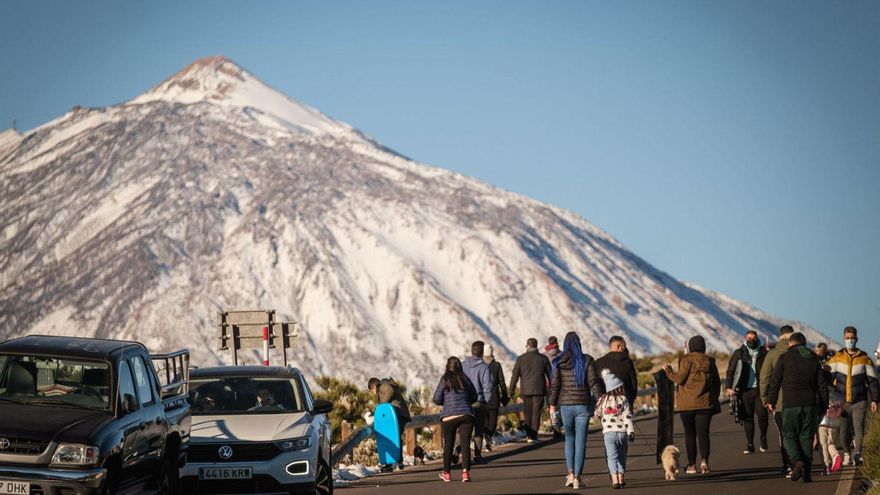
Tenerife Film Commission and people who practice sports in the Teide National Park have expressed their doubts about the limitations established in the new PRUG (Guide Plan for Use and Management) to the activity that they now carry out. In a round table organized within the International Environmental Film Festival of the Canary Islands (Ficmec) they complained that “they seem to have written by hearsay” their proposals to regulate the space.
In fact, the representative of the Tenerife Film Commission, Ricardo Martínez, highlighted that there is no documented record of the harmful effects of the filming, since the bail established for each filming has not been collected. The event, moderated by the journalist Laura Afonso and held as part of the II #Pasasinhuella Conference, was attended by the director of the Teide National Park, Manuel Durbán; the geographer Juan Pedro Hernández; the representative of the Telesforo Bravo-Juan Coello Foundation, Jaime Coello Bravo; the representative of the Tenerife Film Commission, Ricardo Martínez; the runner and organizer of the race from lighthouse to lighthouse, Marcelino Díaz, and the climber and representative of the Sustainable Climbing Association, Javier Martín Carbajal.
Ricardo Martínez, from the Tenerife Film Commission, affirms that there is no evidence of damage from filming
On the table were issues as diverse and transcendental for the future of Tenerife as the carrying capacity of the Island and the National Park, the mobility model, the overexploitation of protected natural spaces, the dependence on tourism, the contradictions between the regulations on paper and the real capacity of the administrations to take charge of compliance or the pressure of powerful economic sectors on politics with the intention of changing decisions in accordance with the regulations.
Also, there was a discussion about the real participation of citizens, the presence of animal and plant species outside the natural space, the need to promote environmental education plans, the disturbances caused by the cable car, the need to find a balance between economic benefits and the protection of the territory, the deterioration of the quality of life on the Island as a result of an economic model that generates a very high exploitation of the territory and demographic pressure unsustainable, among others.
Thus, tourism is key in the overexploitation of the National Park and in exceeding its carrying capacity, since five million visitors can be reached in less than four years, according to figures provided by the director of the Park, Manuel Durbán , pick up a note from the festival organization.
Plan of a luxury hotel
The geographer Juan Pedro Hernández highlighted the existence of a plan for a luxury hotel that has not been eliminated from the Tenerife Insular Planning Plan (PIOT), the lack of regulation of companies that carry out economic activities with tourists, the need to stop the “letting the cable car company do it” and the importance of protecting El Portillo – where it is planned to build an underground car park and create restoration facilities that would require changing the PIOT and the PGO of La Orotava, because it is a non-urban area –. For his part, Coello proposed that the buses that transport visitors through the Mount Teide pick them up at stations in La Esperanza and Aguamansa, an idea Durban rejected.
Athletes see a grievance between the limits to their activity and the promotion of tourism
Coello also pointed out the possibility of considering the environmental restoration of El Portillo and the need to include the debate on the management of the National Park in a larger reflection that encompasses the overload of Tenerife, visible in the pressure on natural spaces in the South of the Isla, traffic jams as an expression of the serious mobility problem and the saturation of health services, among others.
Both the representative of the Telesforo Bravo-Juan Coello Foundation and the Tenerife Film Commission highlighted the importance of providing sufficient personnel resources to the National Park so that it has the capacity to monitor the actions because without this reinforcement the regulation will be «a toast to the sun».
A runner who attended among the public disagreed with the approach of the guest runner at the table, saying that he did not feel threatened by the new regulation. In general, the speakers related to sports activities denounced the “comparative grievance” due to the limits that are established on their activity while tourism is prioritized.















